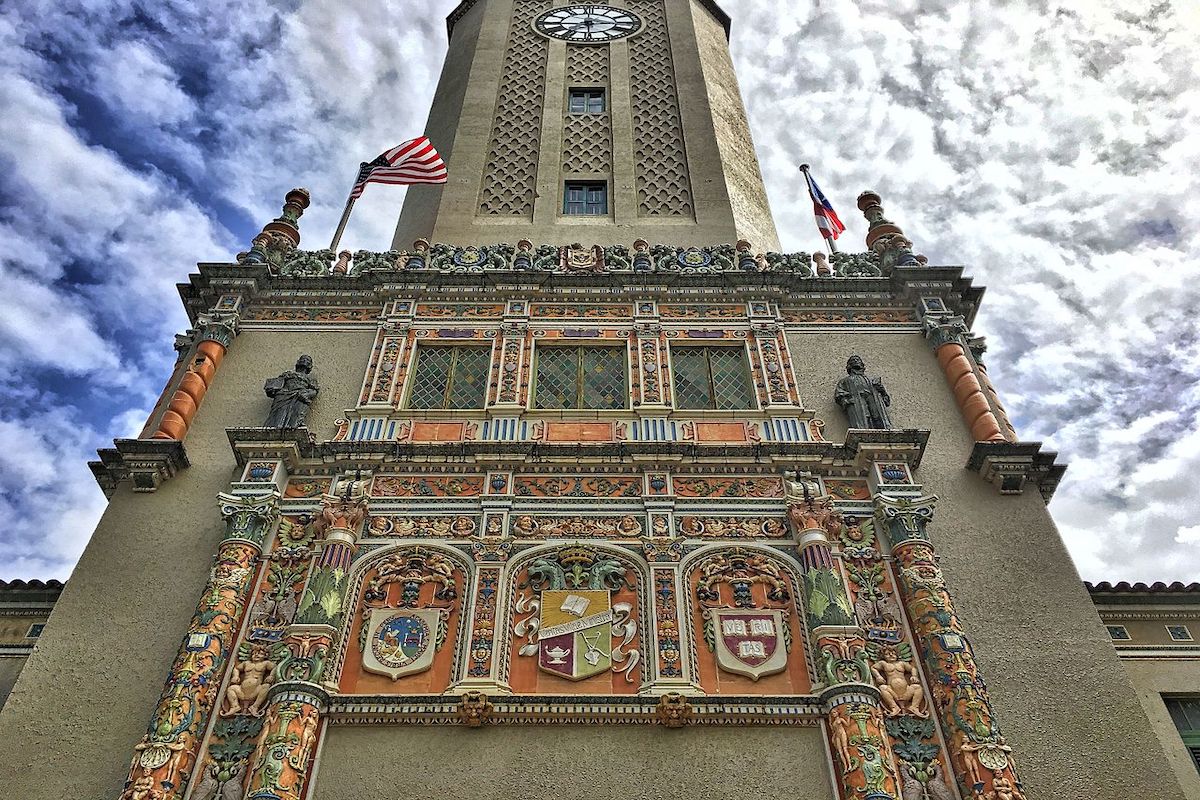

The clock tower at the University of Puerto Rico Río Piedras campus, 2016 (Photo by Alan Levine/CC BY 2.0)
Earlier this month, the University of Puerto Rico Río Piedras campus announced that it will create a new program of Afro-Diasporic and Racial Studies, thanks in part to a $700,000 grant from the Andrew W. Mellon Foundation, a media release from the university noted.
“This grant will support the advancement of the Afro-Descendent and Racial Studies Program from the College of General Studies at the Río Piedras campus of the University of Puerto Rico. We are honored by this accomplishment as this generous award demonstrates the Mellon Foundation’s commitment to our program,” the January 11 release said.
According to the release, the grant period will span three years from January 2021 to December 2023. The release noted that the funds will achieve the following:
- Create the Program of Afro-Diasporic and Racial Studies in the College of General Studies.
- Develop a minor in the College of General Studies and work toward developing a major. There will be 15 credits of academic offerings focused on these topics.
- Sponsor the Third International Congress of Afro-Descendant Cultures and Peoples in Puerto Rico during October 2021.
- Improve curriculum development with the creation of courses that integrate postcolonial, race studies, public humanities, culture, art, the African Continent and the Afro-Diaspora, among others.
- Advance research fields related to this program, such as statistics, epistemologies and decolonization of knowledge.
- Encourage collaborations with other universities in Puerto Rico and abroad.
- Expand access to Afro-Diasporic Studies to other higher education institutions.
“It is a great honor for our campus that an institution as prestigious as the Andrew W. Mellon Foundation has granted us with such a generous recognition. This gesture demonstrates the high regard and great prestige that extend beyond our borders,” Dr. Luis A. Ferrao, Chancellor of the Río Piedras campus, said in the release. “We are deeply grateful to this distinguished institution, and we are certain that these funds will safeguard extensive collections which will fulfill our mission of studying, reflecting and disseminating the vast knowledge that is produced in the Afro-Caribbean Diaspora.”
“As the main educational and scientific center on the island, one of our priorities is to forge professionals with comprehensive and avant-garde training who contribute to the creation of a more just and egalitarian society. Thanks to the Andrew W. Mellon Foundation, a large-scale project will be able to be developed, on transcendental issues for today’s society such as Afro-Descendants and raciality,” UPR President president Dr. Jorge Haddock said in the release. “Equally important, this grant will allow the development and support of research, a fundamental aspect for culture and the humanities. I appreciate your trust and support of our institution, and in the same way, I thank and highlight the commitment, dedication and dedication of the first-rate professionals from the Río Piedras campus who have achieved this important grant, through which we trust they will develop a model project in Puerto Rico and globally. Congratulations.”
The release noted the efforts of the following individuals to make the grant a reality: Dr. Mayra Santos, distinguished professor and writer; Dr. Carlos Sánchez, Dean of the College of General Studies and his team; Dr. María Elba Torres, Director of the Multiculturaland and Interdisciplinary Institute (INIM); as well as Dr. Carlos González Vargas, Dean of Graduate Studies and Research (DEGI) and his collaborators Mrs. Ana Feliciano and Mrs. Mercedes Monagas.
In an email to Latino Rebels founder Julio Ricardo Varela, Dr. Santos said the following about the program: “It is the first in Latin America that will offer an undergraduate degree and that will focus in researching racial perspective from a Latin American and Spanish Caribbean point of view.”
News of the grant has been received extremely positively by Puerto Rican academics:
Amazing news!
— Larry La Fountain (@larrylafountain) January 24, 2021
This is one the best things happening in Puerto Rico right now.
— Dr. Marisel Moreno ?? WEAR-A-MASK (@marisel_moreno) January 24, 2021



Interesting! With money from one of those capitalist racists Republicans!
“thanks in part to a $700,000 grant from the Andrew W. Mellon Foundation”.
Andrew William Mellon (/ˈmɛlən/; March 24, 1855 – August 26, 1937), sometimes A.W., was an American banker, businessman, industrialist, philanthropist, art collector, and politician. From the wealthy Mellon family of Pittsburgh, Pennsylvania, he established a vast business empire before transitioning into politics. He served as United States Secretary of the Treasury from March 9, 1921, to February 12, 1932, presiding over the boom years of the 1920s and the Wall Street crash of 1929. A conservative Republican, Mellon favored policies that reduced taxation and the national debt in the aftermath of World War I.
George $oro$$$ Fundations…$$$$$$$$$$
I PRAY TO OUR LORD THAT THIS UNIVERSITY WILL BRING BETTER KNOWLEDGE TO ALL THE PEOPLE IN PUERTO RICO, SO THAT THEY CAN REALLY UNDERSTAND WHERE THEY STAND IN THIS TOPSY TURVY WORLD, AND MAY IT BE A SPECIAL WAY TO A BETTER LIFE FOR ALL!!!
[…] Earlier this month, the University of Puerto Rico Río Piedras campus announced that it will create a new program of Afro-Diasporic and Racial Studies, thanks in part to a $700,000 grant from the Andrew W. Mellon Foundation, a media release from the university noted. Read more […]
[…] to Michael O’Neal (Society for Caribbean Studies) for bringing this item to our attention.] Latino Rebels reports that, earlier this month, the University of Puerto Rico Río Piedras campus announced that […]
a new degree for professional victims who will contribute nothing to society, disgusting!